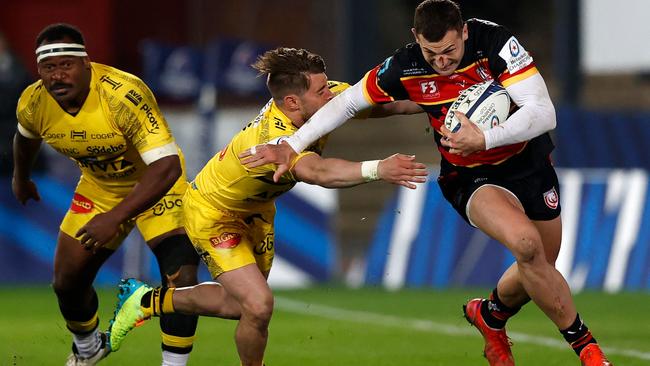Private party that promises profit for the few shrinks sport for the many

The main problem was permanency. The backlash against the failed European Super League was sealed with the fact that the original 12 members would never face relegation. Yes, the greedy game of football burped in fury at the new levels of gluttony on display this week. Managers, players, fans — none of them could conceive of a competition in which performance was not the crucial component.
Teams such as Tottenham Hotspur (oh, all right, and Arsenal) could have wallowed in mediocrity, safe in the knowledge that the business was making millions ... or more. Rugby union operates on a much smaller scale than football but the question remains the same: is the business sport or is sport the business?
In the United States the answer is the latter. The NFL does not have clubs in the traditional sense of English football and rugby; it has franchises. NFL teams are free to follow the money in the interests of profit. Such is the sport of business.
When the business is sport, board members can be corporate kings. But if the players fail on the field, the business does too. Professional football in Britain, bloated with cash as it is, has yet to consider the blasphemy of ending relegation.
The breakaway clubs seemed oblivious to the fact that something perceived as sacred was being sacrificed. No matter how big the business, while rewards and punishments are based on performance on the pitch, the perception is that fans support a team and not a boardroom.
Premiership Rugby — a business without the Football League’s long history — just does not get it. This season’s moratorium on relegation, theoretically because of COVID-19, is a smokescreen to end anything as irritating as slipping out of the top tier. The RFU Council, which sanctioned the moratorium, explained that the impact of the pandemic “could mean relegation based on cancellation and not on-field merit”.
Here’s the reality. To date, seven Gallagher Premiership matches have been cancelled and Worcester Warriors have benefited most, gaining eight points because Harlequins and Newcastle Falcons were unable to fulfil fixtures. Worcester has not won since the first Saturday of the season and is seven points adrift of Gloucester. Without the pandemic, it would be facing relegation.
The argument (on the field) against such a dismissal of Worcester is that, had the trapdoor not been shut, it would have scrapped with more urgency, selected stronger teams, played with that desperate will that comes with fear of relegation. In other words, Worcester is proof that relegation makes the Premiership far more exciting for the fans.
To counter the argument that inferior Greene King IPA Championship teams would weaken the top division more than Worcester (although this season that is unlikely to be the case, with Saracens lurking one league below) a play-off between top and bottom is a perfectly permissible compromise. But the priority is not rugby, nor principles. The sport is a business. Like the failed ESL, it is all too obvious that the bottom line — not the bottom place in the league — is the only thing that matters.
Everton released a statement in which it condemned the six rebel clubs for acting “entirely in their own interests”. The same can be said about the clubs that comprise Premiership Rugby Limited: the 12 in the top flight and Saracens.
For the greater part of the professional era, the RFU has played the part of broker, mostly determined to maintain the link between the leagues and to prevent a cold, corporate-driven cartel of clubs from depriving once-outsiders such as Exeter Chiefs of their dreams.
Round 17 of the Premiership kicked off on Friday when the league leaders, Bristol Bears, face the champions, Exeter. Top versus second. Ten years ago these teams contested the promotion play-off final. But the RFU cracked and agreed to the relegation moratorium for a season. The pandemic is not so much the backdrop as an excuse to make the governing body’s dream a reality. No relegation but promotion for Saracens — and if Ealing Trailfinders can stump up the requisite cash, who knows, maybe it can join the other 13 playing their game of Monopoly.
The RFU has surrounded itself with question marks of its own making after this week’s murky publication of its inquiry into the poor performances of Eddie Jones and England in the Guinness Six Nations this year. With the inquiry lacking any transparency, Jones — the most autocratic of head coaches — has been exonerated.
The union’s credibility continues to plummet because it, like the clubs, is acting entirely in its own interests. Jones is its man and, understandably, he wants extra preparation time for the 2023 World Cup. The clubs wanted an end to relegation, for this season at least. The RFU is willing to make a deal for the sake of its short-term ambitions in 2023.
Far and away the outstanding club league in the world is the Top 14 in France. The battle for survival and the scrap for promotion from Pro D2, the second division, has enabled it to win hefty television contracts while the game spreads to places such as Vannes in Brittany, where the sport thrives in previously unconsidered outposts.
In France the game threatens to flourish. In England the powerbrokers would turn the Premiership into a private party that promises profit for the few and a shrinking sport for the many.
Rugby lacks the history, or depth of support, needed for 13 teams to go it alone and help the game to grow.
The Times





